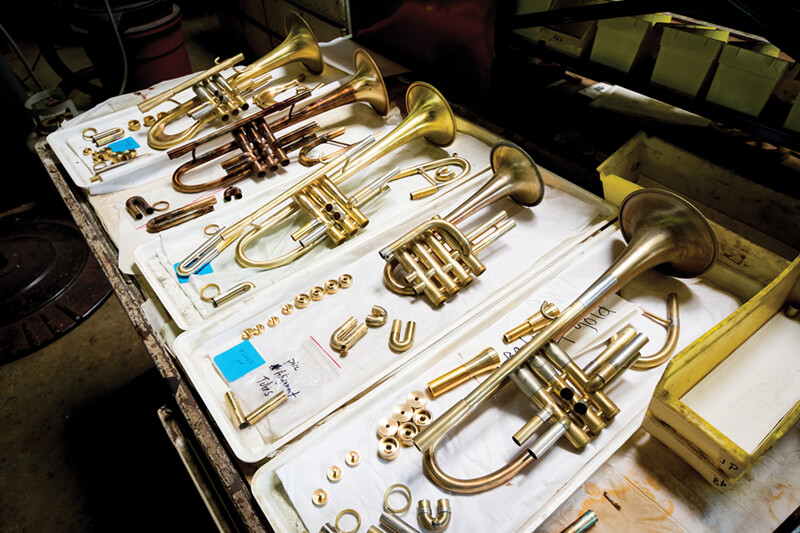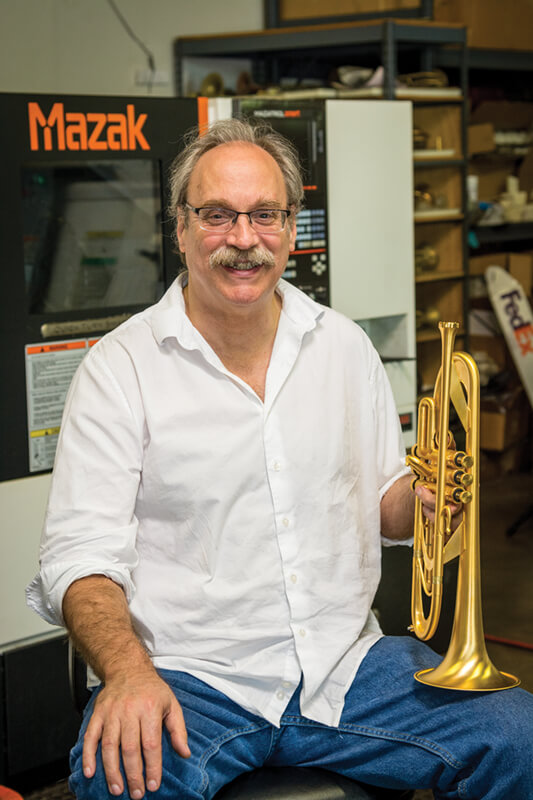Monette Corp.
 Monette trumpets are extremely complicated to manufacture, with 150 individual parts, most of which require machining on Mazak CNC machines.
Monette trumpets are extremely complicated to manufacture, with 150 individual parts, most of which require machining on Mazak CNC machines.Each month, the David G. Monette Corp. (Portland, OR) produces four of the most technologically advanced trumpets in the world. The shop's customer list reads like a "Who's Who" of trumpet players—from Charles Schlueter, former principal trumpet of the Boston Symphony Orchestra, to jazz great Wynton Marsalis, the artistic director of Jazz at Lincoln Center, to the late Maynard Ferguson, noted Canadian jazz musician and bandleader. Each trumpet is tailored to the musician based on where and how they play as well as their individual sound concept.
The manufacturing processes involved in creating a Monette trumpet are complicated. There are about 150 individual parts per horn and approximately 85% of them involve some type of machining. However, the real challenge is that overall resonance must be balanced among each and every one of those parts.
"If we machine a trumpet's bottom valve caps 0.001" [0.03 mm] too small or make them 0.2 gm too light, for instance, it will drastically change what is known as the horn's pitch center," said David Monette, president and owner. "That, in turn, alters the whole sound of the horn and basically throws it out of whack musically and playability-wise."
Monette, an accomplished trumpet player himself, launched the company by machining trumpet mouthpieces and eventually entire horns on manual machine tools. Unfortunately, the equipment stifled the shop's freedom to experiment because of the time and cost of performing those trial operations. Also, the lack of machining speed, performance and flexibility forced the shop to farm out most of the parts—machining work it desperately wanted to keep in house.
"We added CNC machining capability to our operations because, quite frankly, the best job shop in town was unable to make parts to our satisfaction," said Monette. "We brought all our parts production in house, and we now painstakingly make every part perfect, which is time-consuming. A Monette trumpet requires over 200 manhours, and the company produces only four per month. But, our horns are the best and worth 400% more than what they were five years ago when made using manual equipment," said Monette.
Monette's fleet of advanced CNC machine tools was supplied by Mazak Corp. (Florence, KY) and includes a Quick Turn Nexus (QTN) 100 turning center, Quick Turn Smart (QTS) 200 turning center, and a Vertical Center Nexus (VCN) 410A vertical machining center.
The QTN 100 provides Monette with a work envelope that can handle a wide range of trumpet component sizes. For ease and flexibility, the machine's CNC allows the shop to program in either Mazak Mazatrol conversational programming or EIA-ISO programming. The shop also has the option of choosing Mazatrol conversational or EIA/ISO programming on its two-axis QTS 200. Mazak's VCN 410A features a single-table design and ample axis travels, so Monette can process one or more parts in a single machine setup.
According to Dean Willoughby, shop foreman and a highly experienced trumpet player himself, the Mazaks not only give the shop much needed precision, but also part-processing speed, consistency and flexibility. "When it comes to producing mouthpieces, the Mazaks have changed our world," said Willoughby. "We can now design a new prototype mouthpiece shape and 10 minutes later test it on a horn, gather instant feedback and re-machine the shape until it is perfect. In fact, we often have musicians or other customers waiting in our office for their particular mouthpiece or other horn component to be machined so they can test it immediately."
 David Monette transitioned his company to in-house production using Mazak CNC equipment because, “quite frankly, the best job shop in town was unable to make parts to our satisfaction.” A Monette trumpet requires over 200 manhours to manufacture, and the company produces only four a month.
David Monette transitioned his company to in-house production using Mazak CNC equipment because, “quite frankly, the best job shop in town was unable to make parts to our satisfaction.” A Monette trumpet requires over 200 manhours to manufacture, and the company produces only four a month.
In addition to faster processing speed, the Mazak machines help streamline Monette's assembly operations because parts are precise and consistent from one batch to the next. Plus, the machines are, according to Willoughby, easy to program and very user friendly, allowing Monette to achieve component enhancements and improvements that were previously impossible.
Monette's parts are all brass and nickel, except for its split die tooling, which is tool steel. The shop produces its own split dies used to form the trumpets' tuning slides and tubing. Each involves different-size tubing and slides that can require up to 27 different dies to produce.
"We made our first split die for tuning slides on our Mazak VCN 410A," said Willoughby. "The slides have an ovate shape and a decreasing radius that speeds airflow, all of which make the part tough to machine. So we made a die to form it. The resulting slides immediately made our horns play better."
Parts must be perfect, and Monette works to tolerances in the 0.0001" (0.003-mm) range. And because its work materials are so soft, the shop machines at slower speeds and feeds. Mouthpiece blanks, for instance, take seven minutes to rough cut. They are then flipped over and machining their cups requires another three minutes.
"A typical job shop would quickly go out of business if it took them that long to make those parts," said Willoughby. "We do care about machining cycle times, but precision and perfection are much more critical to our end product, so we take our time."
To illustrate, he explained that a size variation of just 0.0001" (0.003 mm) on the taper of a mouthpiece shank equates to it sliding into a horn 0.002" (0.05 mm) too deep. That extremely slight variation, in turn, dramatically alters the instrument's sound—in a bad way.
In addition to exact taper sizes, the rim portions of mouthpieces involve special contours composed of a series of complex points and arcs. With rims, a 0.001" (0.03-mm) dimensional change is considered significant. While Monette produces standard-size mouthpieces, the shop would rather work in person with a musician and custom design their mouthpiece after listening to them play and determining the type of sound and tone they wish to achieve.
Trumpet assembly starts once all the individual pieces are produced—including sections of tubing made from plain rod stock that are turned to precise cylinder sizes on the QTN 100 and QTS 200 machines. The parts then move to the VCN 410A that machines holes and ports.
Other trumpet parts machined on the Mazaks include balusters, top and bottom caps, receivers and ferrals that are matched to each horn. The shop also produces spit valves for its horns and, again, in so doing improves the instrument's sound quality. Unlike other trumpet makers, Monette can maintain much tighter tolerances on its spit valves so they seat better, which reduces air leakage that affects the horn's sound.
After brazing all the parts together, the shop machines brace components that fit between the tubing and support the assembled structure. Those brace parts also require both turning and milling on the Mazak machines.
As seen in Manufacturing Engineering®, October 2016
Copyright Notice: 2016 Copyright by SME. All rights retained. This article may only be viewed or printed one (1) time for personal use. User may not save any text or graphical items to hard drives or duplicate this article in whole or in part in any medium. This article appears with permission from Manufacturing Engineering®, the official publication of the SME. www.sme.org.
